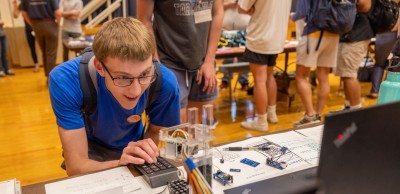Summer Makerspace Mini-Series
05/03/2023
Workshop descriptions
Putting it together – Making Real Connections that Last!
A workshop on identifying and selecting the most appropriate fasteners and adhesives for your project.
In this workshop, we will explore the worlds of fasteners and adhesives. There are thousands of choices out there, each with their own unique, and sometimes obscure, nomenclature. We will use hands-on examples to learn how various fasteners work, how to identify fastener type, how to measure and specify fasteners, and where to look for more technical details. We will also play with various types of adhesives and learn more about their applicability to a range of applications.
When you complete this workshop, you will have a better understanding of the nomenclature and logic behind the vast range of fasteners and adhesives. You will also have a basic toolbox of digital resources to assist you in identifying the appropriate fasteners or adhesives for tasks that you routinely face in the lab or workshop.
Fluids Must Flow: Identification and Selection of Liquid and Gas Fittings
In this workshop, we will explore the world of liquid and gas fittings that are commonly used in the laboratory, in instruments, and in the infrastructure around us. Using hands-on examples, we will learn how various types of pipe, tubing, and interconnect fittings work, how to identify fitting type, how to measure and specify fittings, and where to find more technical details. We will explore in more detail the types of fittings most commonly found in the laboratory environment – particularly those used with chromatography equipment, cooling systems, and more.
When you complete this workshop, you will have a better understanding of the nomenclature and logic behind the variety of fluid fittings that are used in the world. You will also have a basic toolbox of digital resources to assist you in identifying the appropriate fittings for various applications you routinely face in the lab.
Feeling connected: how to design inter-connections for the 3D printer and laser cutter
In this workshop, you will learn digital design techniques for producing inter-connected parts. How can that 3-D printed part interface with your lab equipment or with another 3-D printed part? How can lasercut pieces be put together to form a 3-D object? In these situations, it is a challenge to get a strong, solid connection with minimal gaps between pieces. With the help of this workshop, you will learn about best practices in digital design to achieve success! This is a hands-on workshop, and you should have some familiarity with using design software such as Autodesk Fusion 360 and Adobe Illustrator.
By the end of this workshop, you will be ready to design your own inter-connected parts!
From lab to laptop: Getting started with data acquisition and analysis using LabView software
Do you have instruments or circuitry that you want to connect to your computer for further analysis and display? It is easy to get this up and running quickly by connecting data acquisition hardware to a laptop that is running LabView software. For the workshop, we will provide laptop computers that have LabView pre-installed, as well as the data acquisition hardware. With hands-on activities and demonstrations, you’ll gain practical skills that you can use right away in the lab or for your personal projects.
By the end of this workshop, you will learn how to connect your computer to lab instruments, and how to acquire, process, and display data using LabView software.
Sensible Prototyping for the Researcher
Good design is more than just meeting needs and objectives. In many cases, we must look beyond our own perspectives and pre-conceived notions of the ideal solution. In this workshop, we will learn about appropriately choosing prototyping and fabrication tracks that lead to better outcomes. We will cover the basics of selection of design process, selection of fabrication technology (e.g. laser cut vs. 3D printed vs. hand-fabricated), selection of materials for appropriate strength and chemical compatibility, and considerations for desired interoperability with existing systems. We will also explore repurposing, hacking, and technology transfer – how to identify and apply solutions that might already exist in other fields.
Upon completion of this workshop, you will have a working understanding of the less obvious engineering factors that go into a good functional design.
All workshops will take place in the BeAM @ Murray makerspace. Prior to attending, you should have completed BeAM 101 training. Please contact r.goldberg@unc.edu if you have any questions.
—————————-
These workshops at UNC are supported by Research for All, a multi-institutional project funded by the Kern Family Foundation to increase opportunities for undergraduate research, to eliminate the barriers to participation, and to help students succeed in research opportunities.